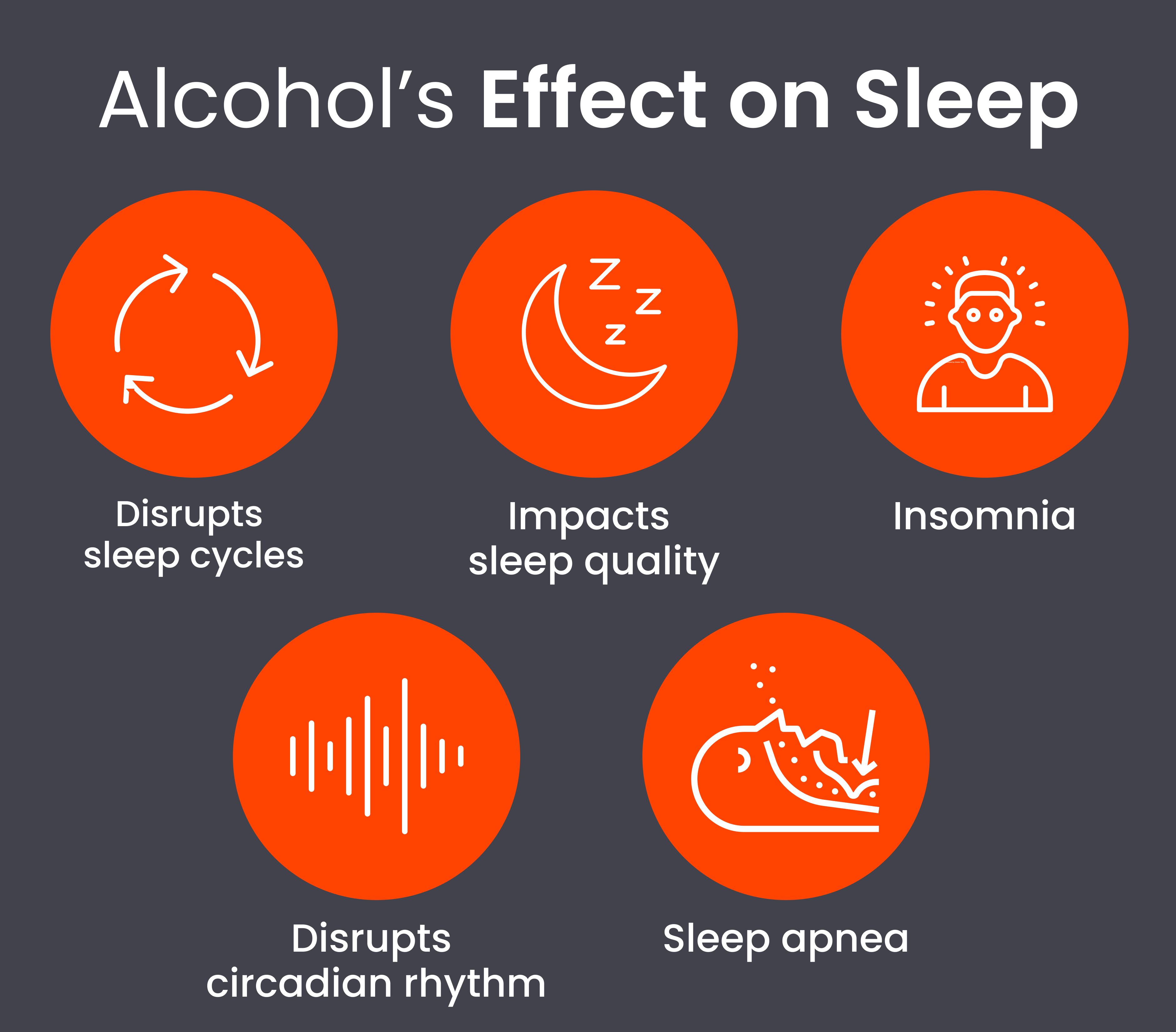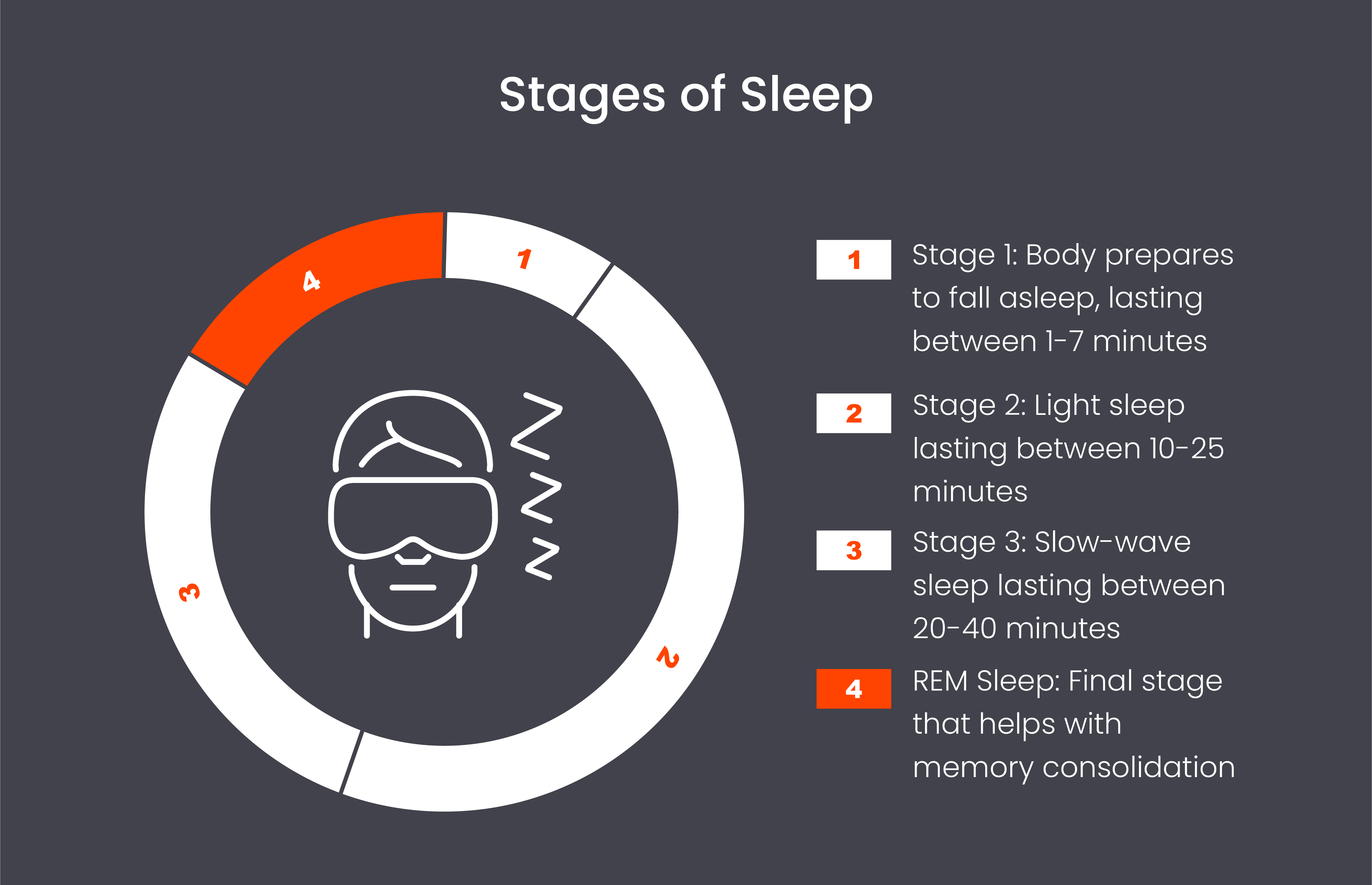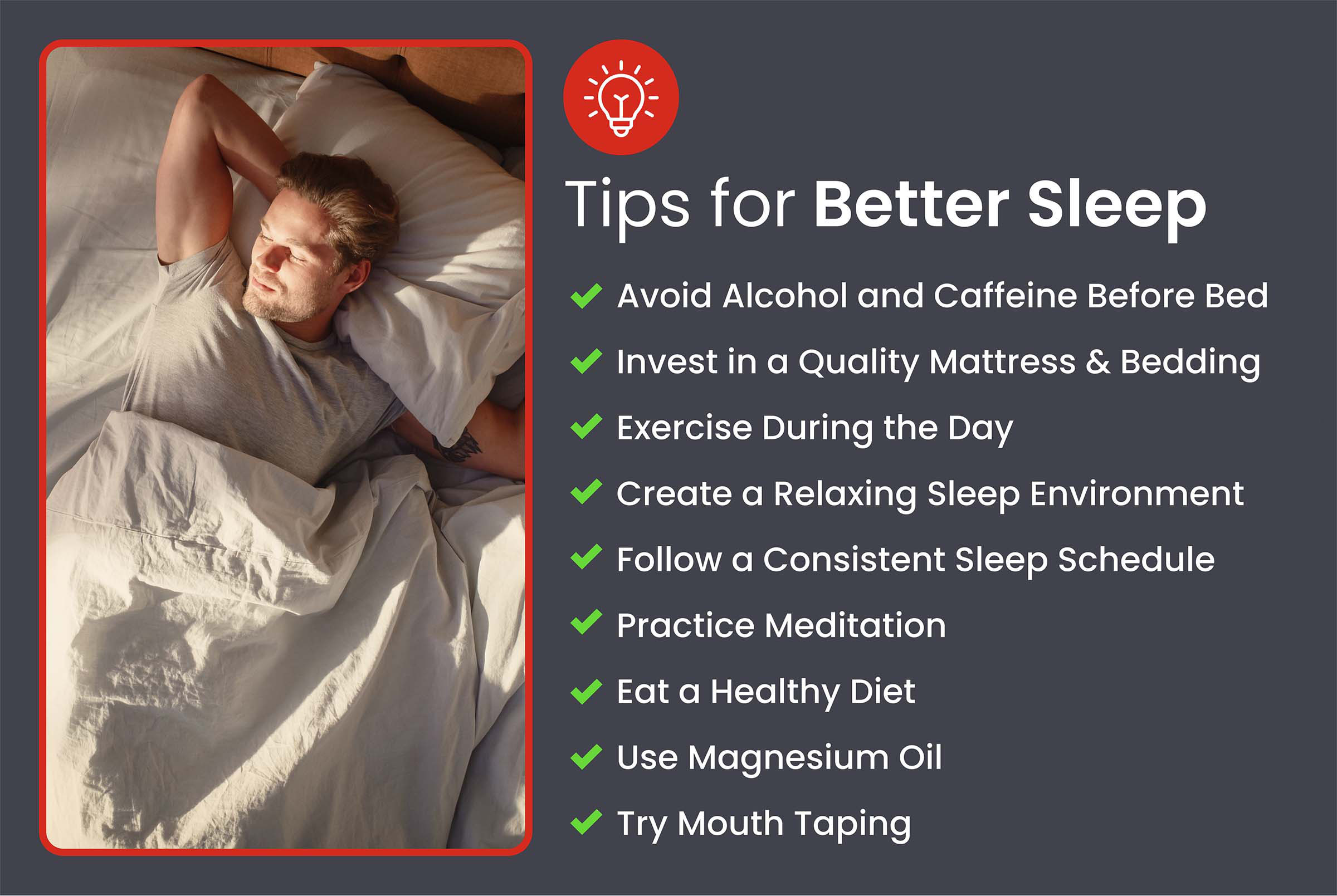Alcohol & Sleep: How Drinking Impacts Sleep

- Key Takeaways
- How Does Alcohol Affect Sleep?
- When Should You Stop Drinking Alcohol Before Bed?
- Tips for Better Sleep
- Alcohol and Sleep FAQs
- Wrapping Up: Alcohol and Sleep
Key Takeaways
- While alcohol may help you fall asleep faster initially, it significantly disrupts sleep quality later in the night, leading to fragmented sleep and frequent awakenings.
- Alcohol reduces time spent in REM sleep — the crucial stage for memory formation and learning — which can impact your mental clarity and alertness the next day.
- Even a single night of drinking can disrupt your body’s natural circadian rhythm, with effects on sleep patterns potentially lasting weeks after stopping alcohol use.
- The impact of alcohol on sleep varies based on factors like age, gender, and tolerance levels, but even small amounts can affect sleep quality.
How Does Alcohol Affect Sleep?
Drinking alcohol and sleeping may seem like they’re not connected, but that is not the case. We now know that alcohol can impact your ability to enter REM sleep, causing poor sleep quality throughout the night. Unfortunately, the effects of alcohol on sleep are worse than they may seem and can lead to sleeping disorders like insomnia and sleep apnea.

Alcohol Affects Sleep Cycles
There are four stages of sleep, and alcohol can impact every one of them. So whether you drink right before bed and have difficulty falling asleep or wake up later in the night, alcohol might be the culprit. Understanding these four stages of sleep can help us better explain how alcohol impacts your sleep quality.

- Stage 1: During the initial sleep stage, you’re not quite asleep or awake, but your body will begin shutting down for the night as your heartbeat, breathing, and eye movements begin to slow. In this stage, you’ll enter light sleep, so sounds and light may be able to wake you easily.
- Stage 2: Stage 2 is the longest stage of sleep. During the second stage of sleep, your body continues its transition into shutting down as your heartbeat and breathing rate continue to slow, and you enter deeper sleep. Your body temperature will also decrease.
- Stage 3: In stage 3, your heartbeat, breathing, and brain activity are fully decreased, and your eye movements stop. Your body is completely relaxed and you’re entering deeper sleep.
- REM Sleep: REM sleep is the fourth stage of sleep and typically occurs within 90 minutes after you fall asleep. During this stage, your eye movements, breathing rate, and heartbeat increase. REM sleep is also when you begin dreaming, and it’s the most important stage of sleep for forming memories and learning.
The stages of sleep repeat multiple times throughout the night, with each cycle lasting for about 90 minutes. Therefore, you’ll likely go through a minimum of four cycles each night if you sleep eight hours. But how does alcohol affect sleep? Alcohol before bed suppresses REM sleep for at least one or two cycles. It’s a sedative or depressant that affects how and when you sleep. Some individuals who drink before bed may be able to fall asleep faster, but if they enter deep sleep too quickly, it can affect REM sleep because it creates an imbalance between the sleep stages. The less REM sleep you get, the lower your sleep quality, which means sleeping for shorter periods of time and waking up throughout the night.
Alcohol Impacts Sleep Quality
Drinking alcohol and sleeping don’t mix well. While a nightcap might make you fall asleep faster initially, research shows it significantly impacts your overall sleep quality. A groundbreaking 36-year study shows just how serious these effects can be.
The study, which followed over 13,000 participants, found that people who regularly drink alcohol are more likely to experience poor sleep quality compared to those who don’t. What’s particularly interesting is that this relationship works in one direction — drinking leads to poor sleep, but poor sleep doesn’t necessarily lead to more drinking.
Here’s what happens when you drink before bed:
- You might fall asleep quickly, but you’ll spend less time in REM sleep (the deep, restorative stage when your brain processes memories and emotions).
- Your sleep becomes more fragmented and less restful.
- Even moderate drinking can disrupt your sleep patterns.
- These effects can persist over time, with the study finding that drinking habits can predict sleep problems years later.
The research also showed that these sleep disruptions aren’t just due to genetics or environment. The alcohol itself is directly affecting your sleep quality. Even a few drinks before bed can have this effect, and the more you drink, the worse your sleep quality becomes.
This means that while alcohol might seem like a helpful sleep aid at first, it’s actually working against your body’s natural sleep processes and could be setting you up for long-term sleep problems.
Alcohol Can Cause Insomnia
Insomnia is a sleep disorder in which people have difficulty falling asleep and staying asleep. Individuals may be able to fall asleep but wake up throughout the night, or they’ll have difficulty falling asleep in the first place. Unfortunately, insomnia can lead to daytime sleepiness and other health issues.
Alcohol is a sedative that affects your sleep and can cause insomnia by reducing REM sleep and causing disruptions in your sleep cycle. Individuals who drink before bed or regularly can experience insomnia-like symptoms, such as excessive sleepiness the following day.
Alcohol and sleep deprivation can be related. According to recent research, alcohol disrupts sleep in a fascinating “two-phase” pattern. While it may help you fall asleep initially, the effects change dramatically throughout the night. During the first few hours, alcohol can indeed improve sleep by increasing total sleep time.
However, as your body metabolizes the alcohol, the second half of your night becomes fragmented, with more frequent awakenings and poorer sleep quality. The study found that even moderate drinking reduces REM sleep throughout the night — the crucial stage when dreaming occurs and memories are consolidated.
Perhaps most surprisingly, alcohol can continue to disturb sleep even after it’s no longer detectable in your system. This pattern helps explain why people who use alcohol as a sleep aid often find themselves caught in a difficult cycle: the disrupted sleep leads to tiredness and sleep inertia the next day, potentially encouraging them to drink again the following night to fall asleep, creating an unhealthy pattern that can worsen over time.
Alcohol Can Disrupt Your Circadian Rhythm
Your body has a natural 24-hour internal clock called your circadian rhythm. Think of it as your body’s built-in timekeeper that helps regulate when you feel sleepy or alert. This rhythm responds to environmental signals like sunlight and darkness, triggering your body to release hormones like melatonin (your natural sleep hormone) when it’s time to rest.
According to a recent comprehensive review, alcohol can significantly disrupt this delicate timing system. The study found that even a single night of drinking can throw off your body clock, with the effects worsening the more you drink. Here’s what happens:
- After just one night of drinking, your body’s natural rhythms start to shift.
- Your body temperature patterns change, staying higher at night when they should naturally drop for sleep.
- Your melatonin production gets disrupted, which can leave you feeling wide awake when you should be sleepy and exhausted when you need to be alert.
- These disruptions can last after the alcohol has left your system.
What’s particularly interesting is that it takes time for your body to get back to normal. While most people’s internal clocks reset within 2-3 weeks of stopping alcohol use, the study found that melatonin production can remain irregular for several months. This helps explain why people who drink regularly often struggle with both falling asleep and waking up at appropriate times.
Alcohol Can Cause Sleep Apnea
Sleep apnea is another sleeping disorder. However, instead of experiencing difficulty falling asleep and staying asleep, individuals with sleep apnea experience abnormal breathing and loss of breath as they sleep. While they may not realize it at the time, this can cause them to wake up throughout the night, ultimately affecting sleep quality by disrupting the normal sleep cycle. A study on alcohol and the risk of sleep apnea concluded that alcohol consumption is associated with a higher risk of developing sleep apnea.
Alcohol may contribute to sleep apnea because it relaxes the muscles in the body, including the throat, which can contribute to breathing problems and snoring. Individuals with existing sleep apnea may experience worsening symptoms due to alcohol, leading to more disrupted sleep and heavier snoring.
When Should You Stop Drinking Alcohol Before Bed?

Since regular alcohol consumption can result in poor quality sleep, researchers at the University of Michigan recommend you stop drinking alcohol at least three hours before bed. While alcohol can make you feel tired in the short term to help you fall asleep, it can and will interfere with your ability to stay asleep. Therefore, while you might feel tired after consuming alcohol, you should avoid going to bed immediately as it can affect your ability to enter REM sleep.
Tips for Better Sleep
While avoiding alcohol before bed can improve your sleep quality, you should also maintain good sleep hygiene to ensure you get the best sleep possible to help you wake up feeling refreshed the next day. There are several things you can do to promote better sleep, including the following:

- Avoid alcohol and caffeine before bed: Caffeine and sleep have a complicated relationship, just like alcohol and sleep. Drinking caffeine or alcohol too close to bedtime can result in poor sleep quality. Caffeine can keep you awake, preventing you from getting enough sleep, while alcohol may initially make you fall asleep faster but cause sleep disruptions throughout the night. In addition, alcohol and caffeine can cause mild dehydration, which may cause you to drink water before bed, forcing you to wake up in the middle of the night to use the bathroom.
- Invest in a quality mattress and bedding: Getting soft, breathable bedding is crucial if you want to prevent night sweats and ensure your body can relax and fall asleep. In addition, you should replace your mattress every seven to ten years and find one that promotes better sleep based on your sleeping position and preferences.
- Exercise during the day: Exercise before bed during the day can help you get rid of any excess energy you have while reducing the stress that might keep you up at night. It’s important not to exercise too close to bedtime because it can give you a short-term energy boost that keeps you awake.
- Create a relaxing sleep environment: Having a relaxing sleep environment that’s free from noise and light can ensure a better night’s sleep. If you live in an apartment with noisy neighbors or street lights that come through your bedroom window, consider using blackout shades and a white noise machine to promote better sleep.
- Follow a consistent sleep schedule: Your body has a natural circadian rhythm it follows for sleep. If you don’t follow a consistent sleep schedule, your body and brain won’t know when it’s time to be asleep or awake, making you feel more exhausted throughout the day and awake at night. If you don’t already have consistent, regular sleep and awake times, adjust your sleep schedule to help your body prepare for sleep and feel more refreshed when you wake up.
- Practice meditation: Meditation may improve sleep quality. Taking a few minutes before bed to practice meditation for sleep can help you calm your mind while preparing your body for rest.
- Eat a healthy diet: Your food choices can significantly impact your sleep quality. Including foods with melatonin in your evening meal can naturally support your body’s sleep-wake cycle.
- Use magnesium oil: Consider adding magnesium oil spray for sleep to your bedtime routine. This natural mineral supplement can help relax your muscles and promote deeper sleep. You can also try other natural sleep aids like lavender, chamomile, and valerian.
- Try mouth taping: While it might sound unusual, mouth taping for sleep can help promote nasal breathing during sleep, potentially reducing snoring and improving sleep quality.
Alcohol and Sleep FAQs
Can alcohol help you sleep?
While drinking alcohol might make you feel tired initially, research shows it’s not an effective sleep aid. When you use alcohol to sleep, you’re essentially borrowing sleep from the second half of your night — you might drift off quickly, but you’ll experience disrupted sleep later as your body processes the alcohol. This leads to poor quality sleep overall and can create unhealthy patterns if used regularly as a sleep aid.
Does alcohol affect everyone’s sleep the same way?
No, alcohol’s impact on sleep varies significantly from person to person, with several key factors influencing how your body responds:
- Age: As we get older, our bodies can’t process alcohol as quickly and become more sensitive to its effects on sleep. Older adults often experience more severe sleep disruptions from alcohol compared to younger people.
- Gender: Women typically experience stronger effects from alcohol on their sleep than men, even when drinking the same amount. This is due to differences in body composition and how alcohol is metabolized.
- Tolerance levels: Regular drinkers may not feel alcohol’s immediate effects as strongly, but studies show their sleep quality is still impacted. In fact, chronic alcohol use can lead to long-term changes in sleep patterns that persist even after stopping drinking.
- Type of alcohol: Different types of alcohol affect sleep in varying ways based on their alcohol content. A 12 oz. beer (5% ABV) may have less impact than a glass of wine (12% ABV) or a shot of vodka (40% ABV), but timing and quantity matter more than the type of drink.
Can drinking a small amount of alcohol affect sleep?
Yes, even one or two drinks can impact your sleep quality. Research shows that any amount of alcohol can reduce REM sleep and disrupt your natural sleep cycles. The key factors are your individual sensitivity, your typical drinking habits, and especially, how close to bedtime you consume the alcohol. Drinking within three hours of bedtime typically has the strongest negative impact on sleep quality.
Wrapping Up: Alcohol and Sleep
Alcohol and sleep have a complicated relationship. On the one hand, alcohol can help you feel tired and put you to sleep faster. On the other hand, it can affect your ability to stay asleep. Drinking alcohol before bed has been linked to poor sleep quality, so experts recommend avoiding drinking for at least three hours before bedtime. This will give your body time to process and eliminate the alcohol before bed, so it’s less likely to affect your sleep quality.
Of course, alcohol isn’t the only thing that can affect your sleep quality. Investing in a good mattress is crucial to helping you fall asleep and stay asleep while preventing aches and pains in the morning. Browse Layla’s mattresses, sheets, and weighted blankets to drastically improve your sleep quality.






